In 2011, Beyoncé released a song that became iconic, whose chorus raises a question that has long bubbled up within us all: “Who run the World? / Girls”. The world may not yet be ruled by women, but some of them, scattered across five continents, are in a position to put it on the right track. We chose six that make us believe in a fairer, more promising and more egalitarian tomorrow.
In 2011, Beyoncé released a song that became iconic, whose chorus raises a question that has long bubbled up within us all: “Who run the World? / Girls”. The world may not yet be ruled by women, but some of them, scattered across five continents, are in a position to put it on the right track. We chose six that make us believe in a fairer, more promising and more egalitarian tomorrow. In 2011, Beyoncé released a song that became iconic, whose chorus raises a question that has long bubbled up within us all: “Who run the World? / Girls”. The world may not yet be ruled by women, but some of them, scattered across five continents, are in a position to put it on the right track. We chose six that make us believe in a fairer, more promising and more egalitarian tomorrow.
Nancy Pelosi
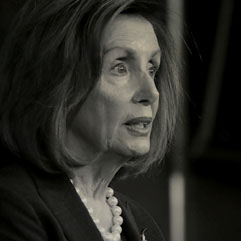
The world knows her as the woman in white, impeccably cut suit, who, last February, tore the sheets of paper that contained the speech given, minutes before, by Donald Trump, at the State Of The Union Address - annual event in which the American president presents himself before members of Congress for a kind of assessment of the past twelve months. The act, seen as revolutionary, was a response to Trump's arrogant attitude upon arriving at the gallery to start his “manifesto”, when he refused to greet her, leaving her with an outstretched hand. But who, after all, is this wonder woman? Nancy Patricia D'Alesandro Pelosi was born in Baltimore, Maryland, on March 26, 1940 and is, nothing more, nothing less, than the Speaker of the United States House of Representatives - one of the two Houses of Congress, the other one iss the Senate - a position she had held before, between 2007 and 2011. In other words, Nancy Pelosi is one of the most important and influential personalities in the current US political chess - after Vice President Mike Pence, she is the second person in the presidential line of succession. Born into an Italian-American family with strong ties to the Democratic Party, legend has it that, as a child, she refused a toy given by a member of the Republican Party. And despite having always shown an interest in social issues, and having been politically active from a young age, it was only when her youngest son was “well on track” that Pelosi, then 47 years old and already residing in California, ran for Congress. It was 1987. A politic of strong convictions, she was House Minority Leaders twice, between 2003 and 2007 and between 2011 and 2019. During those periods, she fought hard for a greater union between the dissenting voices within both her party and her rivals. In January 1991, she voted against authorizing the use of force in Iraq and, in 2002, she did it again. Undaunted, in 2018 she did not hesitate to remain standing for more than eight hours, an attempt that a budget that did not include solutions for illegal immigrants was approved - she did so with the same conviction, and audacity, with which she accepted to be a guest jury in RuPaul's Drag Race All Stars contest. Donald Trump may continue to launch his daily tweets of infamous content, but as long as Nancy Pelosi, the most powerful woman in the United States, walks the Washington corridors, he will have no rest. Thankfully.
Angela Merkel
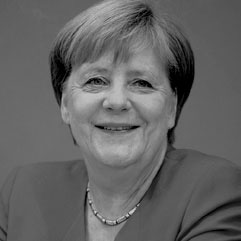
Last July, columnist Paulo Rangel wrote, in Público newspaper, a chronicle entitled “Merkel: An Angel Called Angela?”, which appears as an excellent summary of what the figure of the current German chancellor is. In the text, where he underlined that Merkel “is a singular and exceptional stateswoman, to whom we all owe a lot, but she is not a saint, nor an angel, nor even a special or hidden friend”, the lawyer and politician highlighted two “strong traits, very rare” of this leader. “The first is the honesty, frankness and realism with which she addresses her peers and interlocutors and, not least, her voters. With Merkel, no one creates false expectations or engenders illusions. The second, a clear awareness of the complexity and difficulty of decisions, especially in today’s societies. The science of complexity is obviously at the opposite end of populism, of all populism.” It is no accident that Angela Dorothea Merkel, a native of Hamburg, where she was born on July 17, 1954, is both loved and hated. At the helm of her country's destiny since 2005, she graduated in Quantum Physics, an area she dedicated herself to until 1989. After the 1989 Revolution, which caused the collapse of communism, she entered politics and became a spokeswoman for the first democratically governed government elected in East Germany. After German reunification, she was elected to the Bundestag (German Parliament), and has not left since. Protected by chancellor Helmut Kohl, she was appointed Minister of the Environment, Nature Protection and Nuclear Safety in 1994, and in 1998 she became general secretary of the CDU (Christian Democratic Union), before becoming the party leader, two years after. In 2007, she was president of the European Council and, during her term, played a key role in the negotiations of central issues such as the Treaty of Lisbon, which “amended” the previous Treaty on European Union. As frontal as controversial, Merkel has worked hard to manage the financial crisis, both internally and externally, and has never turned her back on “hot topics” such as the refugee problem - in 2015, she opened her country's borders to thousands of refugees, reinforcing an idea and an asylum system that went (and goes) against the one defended by the majority of her compatriots; she has stated, more than once, that she has no regrets about such a decision. In 2018, she announced that she would not re-run for another term, and perhaps that will finally give her some peace of mind to watch football games, a sport she adores. Because, in the end, being “the most powerful woman in the world”, a title that is repeatedly attributed to her, does not give space, nor time, for much more.
Jacinda Ardern
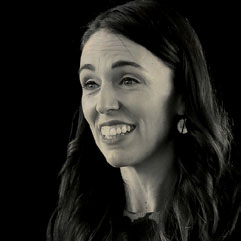
“I think that anyone who is following the covid-19 pandemic and its transmission globally will see, very easily, that the nine cases per day that arise in New Zealand do not compare to the tens of thousands that there are, each day in the USA, they don’t even compare with the numbers of most of the world.” This was how Jacinda Ardern, Prime Minister of that country in Oceania, commented on the statements made, the day before, on August 18, by the President of the United States, at a rally in Minnesota, where he declared that New Zealand was facing “a great increase” of cases, something “terrible.”And where he reinforced, in his populist way: "We don't want that." Jacinda Kate Laurell Ardern, who is little to nothing frightened by the provocations of her American counterpart, responded adequately. "We are still one of the best performing countries in the world when it comes to COVID-19". For this very reason, she stressed, Donald Trump is "obviously completely wrong." And he is: according to data from Johns Hopkins University, in Baltimore, the death rate in New Zealand, per hundred thousand inhabitants, is around 0.45; the USA, on the other hand, has a mortality rate of 51.98 per 100,000 inhabitants - one of the highest on the planet. The theme "coronavirus" matters in Ardern's curriculum because, since the beginning of the pandemic, she was one of the first heads of state to take drastic measures to prevent the spread of the disease. Successfully. The number of infected and dead people was extremely low, despite this “new outbreak” that the country is now experiencing. About her work, she says that nothing is done without the help of a huge team that thinks for the common good, and that “at this moment, I have the humble and privileged opportunity to be a leader.” Born on July 26, 1980 in Hamilton, and ahead of New Zealand's destinations since October 2017, by the Labor Party, she has been internationally praised for her empathy, for giving priority to the well-being of the population, and for the compassion shown in countless situations, notably after the supremacist attack on two mosques in the city of Christchurch, which killed 51 people in March 2019. Last April, she announced a cut of 20% of her salary, of her ministers and of all directors of public bodies, during six months in the context of the crisis economic risk caused by the new coronavirus. "I feel painfully the struggle that many New Zealanders face, as do the people I work with daily," she said at the time. “It is a question of leadership. If there could ever be an occasion to narrow the differences between groups in New Zealand, then this is it.” An advocate of gay marriage and the right to abortion, Ardern is a (real) breath of fresh air on the international political scene.
Kamala Harris
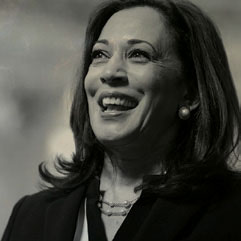
Joe Biden chose her to be his right-hand woman, his number two, should he occupy the much-desired White House Oval Office. "I commit that I will, in fact, pick a woman to be vice president”, said the Democratic candidate in March, before the final debate with Bernie Sanders. The promise was fulfilled. Now, months after countless bets on who the selected would be, Kamala Devi Harris, from Oakland, California, where she was born on October 20, 1964, has become a phenomenon of popularity on a global scale. Not that her path, or her success, depended on this decision. Four years ago, she was acclaimed for being the first black woman elected senator by her state, and the first descendant of Indians to sit in the Senate. Harris, who has always been vocal about her roots, is not afraid of the near future."My mother understood very well she was raising two black daughters. She knew that her adopted homeland would see Maya and me as black girls, and she was determined to make sure we would grow into confident black women", she wrote in her autobiography The Truths We Hold: An American Journey, published in 2019. Graduated in Law by the University of California, in 2003 she became district attorney for San Francisco and, in 2010, attorney general of California, a position she was reelected to in 2014. Two years later he arrived in the Senate, where she always took a critical stance towards the Donald Trump administration. Considered a "rising star" by her peers, it was thanks to her determination and her stance as a tireless fighter that she became one of the preferred candidates for the Democratic nomination of the 2020 presidential candidates. In January 2019, Harris officially announced that she was entering the race, presenting key ideas such as legislation to prevent firearm violence, combating global warming, lowering taxes for the middle class or creating a universal health care system from the existing Medicare - a government-run health program for people aged 65 and over. Widely supported by the bases, she saw that the polls put her in an unfavorable position and, after facing difficulties in raising monetary support, she formalized her withdrawal in December 2019. Less than a year later, and having managed to keep herself a trending topic for her unyielding positions in relation to Trump's misdemeanors, she was one of the first democrats to give her endorsement to Biden, something that she now sees rewarded. When, at the beginning of August, they appeared together for the first time, in an act of campaign, Kamala Harris did not have half words: “I am incredibly honored and I am ready to get to work.”
Sanna Marin
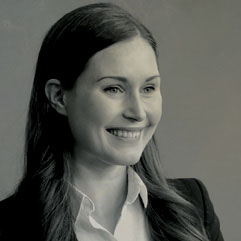
It seemed impossible when, last December, the Finnish parliament confirmed Sanna Marin - "young, feminist, ecologist, mother", as the website of TSF radio wrote at the time - as prime minister. And woman, we add. Affiliated with the Social Democratic Party, Marin became the youngest person (only 34 years old) in the country's history to hold that position. “I never thought about my age or gender. I think of the reasons I got into politics and those things for which we have won the trust of the electorate”, she said, the night she was nominated by her coalition partners. Born in Helsinki on November 16, 1985, Sanna Mirella Marin comes from a family without possessions (she started working at 15, to help support her studies) and relatively unusual - her parents separated when she was still a child, and the mother remarried, to a woman. All of this has probably affected not only her path, but also the options she has been taking regarding governmental choices, always guided by equality and human rights. “I came from a poor family and I would not have access to the means to make a living without the welfare state and the Finnish education system. I came from a rainbow family and that means that equality and human rights are important to me”, she declared in an interview with a newspaper from her country. Climate is also one of her priorities. “We have to stop consuming excess resources on our planet and do more with less. We need to think carefully about which products can be replaced by services. And we must ensure that everything we produce is done in a sustainable way, to make resources more efficient so that they can be repaired, remanufactured and, finally, recycled”, she declared at a lecture at Columbia University in New York. Graduated in Administration from the University of Tampere, she applied for the first time, without success, to the Tampere City Council, in 2007. In 2012, she returned to the charge, and won. In 2015, she became a deputy and her charisma quickly made her rise to the highest spheres of her party. Last year, the serious illness and subsequent decline of the then leader of the SDP, Antti Rinne, made Marin his obvious successor. This year, after the first months as prime minister and high levels of popularity, the head of government made room in her tight schedule to tie the knot with her old companion. In August, she married Markus Raikkonen, with whom she has been for 16 years and with whom she has a daughter. The show must go on, and it will have a happy ending. That’s our hope.
Ruth Bader Ginsburg
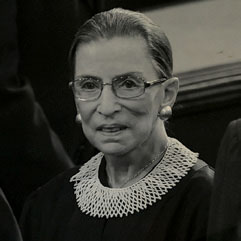
At the end of the 2000s, someone said that there were three pop icons on the planet: Cristiano Ronaldo, Beyoncé and Barack Obama. They forgot to add to the list Ruth Bader Ginsburg, judge, magistrate of the Supreme Court of the United States of America and veteran in the defense of women's rights. At 87, the lawyer (she started studying at Cornell University, in Ithaca, New York, where she earned her bachelor's degree, and it was there that she met her husband, Martin D. Ginsburg, and ended up enrolling at the prestigious Law School of Harvard, in 1956, where she was one of nine women on a class with 500 men) is one of the most powerful people in her country, both for her exemplary career and for always staying true to her principles - and one of the most cherished, since her nickname, Notorious RBG, a pun on the name of the late rapper Notorious B.I.G., appears printed on mugs, t-shirts, pins, and other souvenirs. In 2018, filmmakers Betsy West and Julie Cohen made a documentary about her life, dubbed, precisely, RBG, which ended up winning awards such as the BAFTA for Best Documentary. But where does this fascination come from? We could start with the effort that Ginsburg made to complete her studies even after the Harvard dean supposedly asked the (few) female students “How do you justify taking a place that should belong to a qualified man?” Or we could push for her persistence, in continuing her education and maintaining her marriage - in addition to classes, she was in charge of a 14-month-old baby, her first daughter, and when her husband was hired for a job at the Big Apple, Ruth moved to Columbia Law School, where she finally graduated in 1959. Early in her career, she was rejected several times for her gender, despite having numerous teacher recommendations. But the fiber of RBG, daughter of Jewish immigrants, born on March 15, 1933 in Brooklyn, was not that of dropouts. She was an activist, associate professor, founded innovative projects in the fight for women's rights within the American Union for Civil Liberties (ACLU) and, as a lawyer, she never refused to accept “lost” cases - the so-called “unprecedented” cases, which have no end comparison with another occurrence in the past and, in a way, diminish the chances of victory - which could mean an advance in the fight for equality between men and women. In 1993, President Bill Clinton appointed her to the US Supreme Court, where he stood out, among other things, for being the first member of that organization to openly speak out in favor of legalizing abortion. Wonderfully ahead of her time, RBG, whose brand image is a small ponytail at the top of the head, thick glasses, and large collars that protrude over the toga, and who despite her fragile health remains active, is a proud feminist. One of the quotes she most appreciates is by the American suffragette Sarah Grimké: “I ask no favor for my sex. All I ask of our brethren is that they take their feet off our necks.”
Translated from Vogue Portugal's Hope issue, out September 2020. All credits in the original articles.Texto em português na edição em print.
Most popular


Editorial | The Naif Issue, fevereiro 2026
03 Feb 2026

Relacionados
.jpg)
.jpg)



